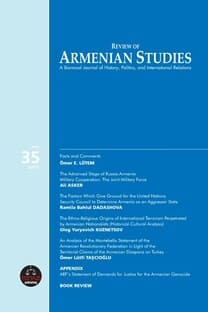PERİNÇEK-İSVIÇRE DAVASI’NA BİR BAKIŞ: ERMENİ-TÜRK İHTİLAFININ GÜNCEL VE GELECEKTEKİ OLASI DURUMUNUN ANLAŞILMASI İÇİN BİR DAVA ANALİZİ
Avrupa İnsan Hakları Mahkemesi’nin (AİHM) baktığı, YahudiHolokost’nun inkârı haricindeki, ilk ‘soykırım inkârı’ davası olan Peinçekİsviçre Davası, ifade özgürlüğü ve nefret söylemi olarak adlandırılabilecekolgu arasındaki hassas ilişkiye dair felsefi, hukuki ve siyasi karmaşıklığı ortayaçıkarmıştır. Bu dava, güncel bir cereyan olan hafıza yasalarının mevzuatı ilebirlikte beliren ifade özgürlüğünün meşru sınırları ile ilgili sorunsalı gündemegetirmiştir. Buna ilaveten, AİHM kararı, tarafların ve üçüncü taraflar olarakErmeni ve Türk hükümetlerinin AİHM Büyük Daire’deki savları, 1915 olaylarıetrafında şekillenmiş olan Ermeni-Türk ihtilafının güncel hali ve müstakbeldurumu hakkında önemli göstergelerdir. AİHM Büyük Daire’nin son kararı,ihtilafın gelecekte alacağı niteliği belirleyen etkenlerden olacaktır. Yaklaşık onseneye yayılmış olan dava süreci, şu anki halleriyle hafıza yasalarının kusurluve suiistimale açık olduklarını göstermektedir. Perinçek-İsviçre Davası,popüler ve akademik literatür ve söylemde soykırım kavramının özensizkullanımının iltibas ve suiistimale neden olduğunu göstermektedir. Dava, aynızamanda, 1915 olayları hakkındaki tartışmaları belirleyen ahlak temellisöyleme karşın, ‘soykırım siyaseti’ne örnek teşkil eden bir olaydır. Bununyanında, AİHM karar metni, ‘Yahudi Holokostu modeli’nin 1915 olaylarıüzerine giydirilmesi sonucu ortaya çıkan hegemonik ‘mit’lerin ortadankaldırılmasına yarayacak çok önemli bir uluslararası belge niteliğindedir.Bununla birlikte, AİHM Büyük Daire görülen duruşma göstermektedir ki,Ermeni tarafı 1915 olaylarını ‘Ermeni Holokostu’ olarak nitelendirmeye devamedecektir
A LOOK AT THE PERİNÇEK V. SWITZERLAND CASE: EXAMINATION OF A LAWSUIT TO UNDERSTAND THE CURRENT STATE OF THE ARMENIAN-TURKISH DISPUTE AND PROSPECTIVE DEVELOPMENTS
As the first ‘genocide denial’ case before the European Courtof Human Rights (ECHR) other than those on the denial of JewishHolocaust, Perinçek v. Switzerland is a case that unveils philosophical,legal and political complexities related to the subtle relationship betweenfreedom of expression and what can be generically called hate-speech. Itis a case that reveals the problem of legitimate limitation on freedom ofexpression that the recent trend of the legislation of memory laws bringswith it. In addition, the verdict of the ECHR, and the arguments of theparties and the governments of Armenian and Turkey as the third partiesin the ECHR Grand Chamber are important indicators of the current stateof the Armenian-Turkish dispute that has evolved around 1915 events andthe prospective developments. The final verdict of the ECHR GrandChamber is likely to shape the future framework of the dispute. Theexamination of almost ten-year long legal process demonstrates thatmemory laws in their present form are imperfect and vulnerable to abuse.The Perinçek v. Switzerland case reveals the imprecise employment of theterm genocide in popular and academic literature and discourse thatresults in ambiguities as well as misuses. The Case also constitutes anexample of the ‘genocide politics’ notwithstanding the moral discoursethat dominates the debates around 1915 events. Moreover, the ECHRverdict is an international document with outmost significance that servesas a corrective to the hegemonic ‘myths’ on the 1915 events that are effectsof the employment of the ‘Jewish Holocaust model’. Nevertheless, theECHR Grand Chamber hearing displays that the Armenian side willcontinue impose the characterization of the 1915 events as the ‘ArmenianHolocaust’
